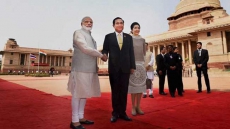Putting its economic liberalisation agenda on the fast track, India on Monday relaxed its foreign equity norms further, notably in defence, aviation, pharmaceuticals and retailing, with automatic approval rather than a case-based route as the preferred model.
In aviation, extant policy allowed up to 49 per cent foreign equity in scheduled airlines under the automatic route. Now, while the cap has been raised to 100 per cent, up to 49 per cent would be under automatic and beyond that will be under the government approval routes, officials said.
Then in pharmaceuticals, both greenfield and brownfield projects could get 100 per cent foreign capital, but with an automatic route for the former and government route for the latter. Now, brownfield projects, too, will come under automatic route for up to 74 per cent.
In defence manufacturing, the 49 per cent norm under automatic approval will continue. But while looking at the proposals that call for investment beyond 49 per cent, a condition that they will bring with them access to "state-of-the-art" technology has been done away with.
"The Union Government has radically liberalized the foreign direct investment regime today, with the objective of providing major impetus to employment and job creation," an official statement said.
"The decision was taken at a high-level meeting chaired by Prime Minister Narendra Modi. This is the second major reform after the last radical changes announced in November 2015. Now most of the sectors would be under automatic approval route, except a small negative list," it said.
"With these changes, India is now the most open economy in the world for foreign investment."
Commerce and Industry Minister Nirmala Sitharaman told reporters later that the steps taken on Monday were in line with the idea of making India a preferred destination for industry with a focus on employment. She said investments shall be encouraged so that more jobs can be created.

"We've made sure foreign equity inflows are given a clear direction with the objective of 'Make in India'. Our focus clearly is on creating jobs and ensuring that India becomes a manufacturing hub," the minister added.
Other Highlights:
- Foreign equity of 100 per cent under government approval for trading in processed foods, including via e-commerce, in respect of products manufactured in India.
- Foreign equity of 100 per cent under automatic route in broadcast service industry, including direct-to-home, mobile TV, head-end in the sky and cable networks.
- Equity cap on private security agencies tweaked to permit up to 49 per cent under automatic route, as opposed to government nod, and up to 74 per cent under government route, which was not permitted at all earlier.
- The requirement of local sourcing relaxed for three years and some sops in this regard for five years for foreign equity in single-brand retailing, for products having state-of-art and cutting edge technologies.
the decision on single brand retailing should particularly help US-based Apple which has its own stores globally but sells through other retail chains in India due to sourcing restrictions.
"Today’s amendments to the foreign direct investment policy are meant to liberalise and simplify the policy so as to provide ease of doing business in the country leading to larger inflows, contributing to growth of investment, incomes and employment," the statement said.
In the past two years the Narendra Modi Government has made major policy reforms in the area of foreign direct investment in areas such as defence, construction, insurance, pension, single-brand retailing, plantations and aviation.
As a result, official data suggests, India attracted $55.46 billion worth of foreign investment in 2015-16, against $36.04 billion during the financial year 2013-14. "This is the highest ever foreign direct investment inflow for any particular financial year," the statement said.

"However, it is felt the country has potential to attract far more foreign investment, which can be achieved by further liberalising and simplifying the foreign investment regime. India today has been rated as Number One FDI investment destination by several international agencies."


